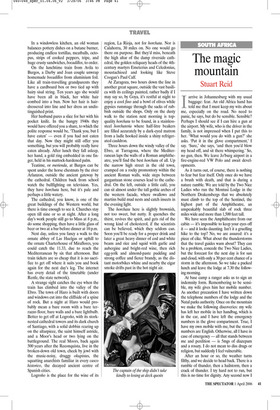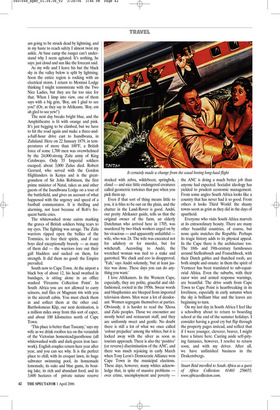The magic mountain
Stuart Reid
Iarrive in Johannesburg with my usual baggage: fear. An old Africa hand has told me that I must keep my wits about me, especially on the road. No need to panic, he says, but do be sensible. Sensible? Perhaps I should see if I can hire a gun at the airport. My wife, who is the driver in the family, is not impressed when I put this to her. ŌĆśWhat would you do with a gun?ŌĆÖ she asks. ŌĆśPut it in the glove compartment,ŌĆÖ I say. ŌĆśSure,ŌĆÖ she says, ŌĆśand then youŌĆÖd blow my head off, and sit there whimpering.ŌĆÖ So, no gun, then. We leave JoŌĆÖburg airport in a fire-engine-red VW Polo and await developments.
As it turns out, of course, there is nothing to fear but fear itself. Only once do we have a brush with death, and that is during a nature ramble. We are told by the Two Nice Ladies who run the Montusi Lodge in the Northern Drakensbergs that we absolutely must climb to the top of the Sentinel, the highest part of the Amphitheatre, an unspeakably beautiful slab of rock three miles wide and more than 1,500 feet tall.
We have seen the Amphitheatre from our cabin ŌĆö itŌĆÖs impossible to keep your eyes off it ŌĆö and it looks daunting. IsnŌĆÖt it a gruelling hike to the top? No, we are assured: itŌĆÖs a piece of cike. What about the thunderstorms that the travel guides warn about? They can be a problem, concede the Two Nice Ladies, but the forecast for the next day is for sun and cloud, with only a 30 per cent chance of a storm in the afternoon. So we take a packed lunch and leave the lodge at 7.30 the following morning.
At base camp a ranger asks us to sign an indemnity form. Remembering to be sensible, my wife gives him her mobile number. As another precaution I have written down the telephone numbers of the lodge and the Natal parks authority. Once on the mountain we make the following discoveries: my wife has left her mobile in her handbag, which is in the car, and I have left the emergency numbers in the glove compartment. True, I have my own mobile with me, but the stored numbers are English. Otherwise, all I have in case of emergency ŌĆö all that stands between me and perdition ŌĆö is 5mgs of diazepam and a rosary. I do not mean to diss drugs or religion, but suddenly I feel vulnerable.
After an hour or so, the weather turns filthy, and we decide to head back. There is a rumble of thunder, then a hailstorm, then a crack of thunder. I try hard not to run, but this is no time for dignity. Any second now I am going to be struck dead by lightning, and in my haste to reach safety I almost twist my ankle. At base camp the ranger canŌĆÖt understand why I seem agitated. ItŌĆÖs nothing, he says: just cloud and sun like the forecast said.
As my wife and I leave his hut the black sky in the valley below is split by lightning. Soon the entire region is rocking with an electrical storm. I return to Montusi Lodge thinking I might remonstrate with the Two Nice Ladies, but they are far too nice for that. When I limp into view, one of them says with a big grin, ŌĆśBoy, am I glad to see you!ŌĆÖ (Or, as they say in Afrikaans, ŌĆśBoy, em ah gled to see yew!ŌĆÖ) The next day breaks bright blue, and the Amphitheatre is lit with orange and pink. ItŌĆÖs just begging to be climbed, but we have to hit the road again and make a three-anda-half-hour drive east to Isandlwana, in Zululand. Here on 22 January 1879, in temperatures of more than 100┬░F, a British force of some 1,700 men was overwhelmed by the 24,000-strong Zulu army of King Cetshwayo. Only 55 Imperial soldiers escaped; about 3,000 Zulus died. Robert Gerrard, who served with the Gordon Highlanders in Kenya and is the greatgrandson of Sir John Robinson, the first prime minister of Natal, takes us and other guests of the Isandlwana Lodge on a tour of the battlefield, and gives an account of what happened with the urgency and speed of a football commentator. It is thrilling and alarming, not least because of RobŌĆÖs frequent battle cries.
The whitewashed stone cairns marking the graves of British soldiers bring tears to my eyes. The fighting was savage. The Zulu warriors ripped open the bellies of the Tommies, to free their spirits, and if our boys died exceptionally bravely ŌĆö as many of them did ŌĆö the warriors tore out their gall bladders and sucked on them, for strength. It did them no good: the Empire prevailed.
South now to Cape Town. At the airport a black boy of about 12, his head swathed in bandages, is sitting alone in an office marked ŌĆśFirearms Collection PointŌĆÖ. In South Africa you are not allowed to carry scissors, nail files or Magnum 44s with you in the aircraft cabin. You must check them in and collect them at the other end. Bartholomeus Klip, our next destination, is a million miles away from this sort of caper, and about 100 kilometres north of Cape Town.
ŌĆśThis place is better than Tuscany,ŌĆÖ says my wife as we drink rooibos tea on the verandah of the Victorian homestead/guesthouse (all whitewashed walls and dark-green iron lacework). English couples return here year after year, and you can see why. It is the perfect place to chill, with its croquet lawn, its huge saltwater swimming pool, its homemade lemonade, its oaks and blue gums, its boating lake, its rich and abundant food, and its 3,600 hectares of private nature reserve stocked with zebra, wildebeest, springbok, eland ŌĆö and nice little endangered creatures called geometric tortoises that pee when you pick them up.
Even if that sort of thing means little to you, it is bliss to be out on the plain, and the chatter in the Land-Rover is good. Andri, our pretty Afrikaner guide, tells us that the original owner of the farm, an elderly Dutchman who arrived here in 1705, was murdered by two black workers urged on by his vivacious ŌĆö and apparently unfaithful wife, who was 24. The wife was executed not for adultery or for murder, but for witchcraft. According to Andri, the wretched woman was tied to a stake and garrotted. We cluck and coo in disapproval. ŌĆśYah,ŌĆÖ says Andri solemnly, ŌĆśbut at least justice was done. These days you can do anything you want.ŌĆÖ I love Afrikaners. In the Western Cape, especially, they are polite, graceful and oldfashioned, rooted in the 1950s. Swear words and blasphemies are bleeped from imported television shows. Men wear a lot of deodorant. Women segregate themselves at parties. Obviously, it is harder to read the Xhosa and Zulu peoples. Those we encounter are mostly hotel and restaurant staff, and they are uniformly sweet and gentle. No doubt there is still a lot of what we once called ŌĆścolour prejudiceŌĆÖ among the whites, but it is locked away with the silver as soon as tourists approach. There is also the ŌĆśpositiveŌĆÖ (or reverse) discrimination of the ANC, and there was much rejoicing in early March when Tony LeonŌĆÖs Democratic Alliance won Cape Town in the municipal elections. These days, however, many whites acknowledge that, in spite of massive problems over crime, unemployment and poverty ŌĆö the ANC is doing a much better job than anyone had expected. Socialist ideology has yielded to prudent economic management. From some angles South Africa looks like a country that has never had it so good. From others it looks Third World: the shanty towns seem as grim as they did in the days of apartheid.
Everyone who visits South Africa marvels at its extraordinary beauty. There are many other beautiful countries, of course, but none quite matches the Republic. Perhaps its tragic history adds to its physical appeal. In the Cape there is the architecture too. The 18thand 19th-century farmhouses around Stellenbosch and Franschhoek, with their Dutch gables and thatched roofs, are both simple and ornate: in them the spirit of Vermeer has been translated to sub-equatorial Africa. Even the suburbs, with their razor wire and armed response warnings, are beautiful. The drive south from Cape Town to Cape Point is heartbreaking in its loveliness, especially in early autumn when the sky is brilliant blue and the leaves are beginning to turn.
On my last day in South Africa I feel like a schoolboy about to return to boarding school at the end of the summer holidays. I consider having a good cry but flip through the property pages instead, and reflect that if I were younger, cleverer, braver, I might have a future here. Casting aside self-pitying fantasies, however, I resolve to return soon, and with my driver. After all, we have unfinished business in the Drakensbergs.



























































































 Previous page
Previous page